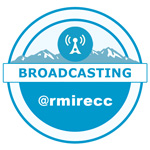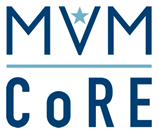MIRECC / CoE
Rocky Mountain MIRECC for VA Suicide Prevention

Updated: 19 September 2019
- Suicide Prevention
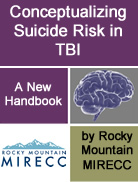 Conceptualizing Suicide Risk in TBI: A Supplemental Handbook
Conceptualizing Suicide Risk in TBI: A Supplemental Handbook- This handbook presents an overview of Traumatic Brain Injury (TBI), a kind of "TBI - The Basics" course. The handbook then explores the relationship between TBI and suicide risk, and the relationship between executive dysfunction and suicide risk. Presented in an easy to digest manner for our very busy clinician. This a must have for clinicians.
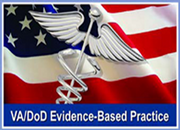 VA/DoD Clinical Practice Guidelines
VA/DoD Clinical Practice Guidelines- Implementation of evidence-based clinical practice guidelines is one strategy VHA has embraced to improve care by reducing variation in practice and systematizing “best practices”. Guidelines address patient cohorts, serve to reduce errors, and provide consistent quality of care and utilization of resources throughout and between the VA and DoD health care systems.
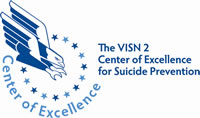 TIP 50: Addressing Suicidal Thoughts and Behaviors in Substance Abuse Treatment
TIP 50: Addressing Suicidal Thoughts and Behaviors in Substance Abuse Treatment- This interactive web-based training addresses evidence-based, best-practices Treatment Improvement Protocols (TIPs) for treating substance use disorders (SUDs), developed by Center for Substance Abuse Treatment (CSAT), part of the Substance Abuse and Mental Health Services Administration (SAMHSA) of U.S. Department of Health and Human Services. The audience for TIPs is expanding in Veterans Administration mental health, primary care, and other health care and social service settings. This program will give mental health providers in all disciplines up to date, standardized skills assessment training to assess suicidality, and develop effective treatment plans to prevent suicide in Veterans. Also, the TIP 50 Training is available via DVD! Order the free DVD!
- SPRC: Find Resources and Programs
- The purpose of the Best Practices Registry (BPR) is to identify, review, and disseminate information about best practices that address specific objectives of the National Strategy for Suicide Prevention. The BPR is a collaborative project of the Suicide Prevention Resource Center (SPRC) and the American Foundation for Suicide Prevention (AFSP). It is funded by the Substance Abuse and Mental Health Services Administration (SAMHSA).
- TBI Resources
- TBI and PTSD in the Post 9/11 Era: From Research to Practice
- Presented by: Lisa Brenner PhD ABPP(Rp) and Nasi Bahraini PhD
- 30 September 2014
- This presentation reviews key research findings regarding the co-occurrence of mild traumatic brain injury (mTBI) and posttraumatic stress disorder (PTSD) and their implications for evaluating and treating Veterans with both conditions. Specific topics covered include the shared underlying mechanisms that may contribute to the increased risk of PTSD in those with mTBI, and the role of symptoms in differential diagnosis. Additionally, findings from pharmacological and psychological interventions studies of PTSD and mTBI will be reviewed in order to highlight important strategies for patient care. Target Audience: Practitioners who provide care to patients with co-occurring mTBI and PTSD, including those working in primary care and behavioral/mental health settings, as well as clinical researchers interested in TBI and PTSD co-morbidity.
- Go to online presentation (Video, PDF, Audio and Transcript)
- The DSM-5 Approach to Evaluating Traumatic Brain Injury
- By Hal Wortzel MD and David Arciniegas MD
- 4 September 2014
- The Diagnostic and Statistical Manual of Mental Disorders, Fifth Edition (DSM-5) approach to the evaluation of traumatic brain injury (TBI) and its neuropsychiatric sequelae has changed substantially relative to that in prior versions of this manual. These changes are especially evident in the DSM-5 section on Neurocognitive Disorders, which presents a definition of TBI modeled after that of the American Congress of Rehabilitation Medicine and organizes evaluation of the neuropsychiatric sequelae of TBI around mild and major neurocognitive disorders. This lecture will review these and related matters in the DSM-5 approach to TBI and their implications on the care of Veterans with such injuries. Intended Audience: Clinicians evaluating and/or treating Veterans with TBI (physicians, psychologists, nurses, social workers)
- Go to online presentation (Video, PDF, Audio and Transcript)
- Management of TBI Rehab/Co-occurring Mental Health Issues: Posttraumatic Stress Disorder, Suicide, Depression, Substance Use Disorders, and Pain Disorders
- By Lisa Brenner PhD, ABPP(Rp); Alison Cernich PhD; Jennifer Vasterling PhD
- 13 November 2013
- This seminar will provide an overview of common co-occurring disorders that present rehabilitation challenges for individuals with Traumatic Brain Injury (TBI). Background information, as well as, evidence based assessment and treatment strategies will be provided for: Posttraumatic Stress Disorder, suicide, depression, substance use disorders, and pain disorders. The Traumatic Brain Injury, Pain, and Substance Use Disorders portion will focus on the comorbidities of pain and substance use disorders, beginning with a discussion of epidemiology of the disorders in the TBI population. Implications of these co-occurring disorders for rehabilitation professionals will be discussed. The PTSD and TBI segment will cover a) the epidemiology of co-morbid PTSD and TBI in military service members and veterans and b) an overview of issues relevant to clinical management of the co-morbidity including assessment and treatment.
- Go to online presentation (Video, PDF, Audio and Transcript)
 Rocky Mountain MIRECC wishes to thank the Ohio Valley Center for Brain Injury Prevention and Rehabilitation for their generous permission to provide all the information and educational material below. Every link and resource is from Ohio Valley Center for Brain Injury Prevention and Rehabilitation.
Rocky Mountain MIRECC wishes to thank the Ohio Valley Center for Brain Injury Prevention and Rehabilitation for their generous permission to provide all the information and educational material below. Every link and resource is from Ohio Valley Center for Brain Injury Prevention and Rehabilitation.
Ohio Valley Center for Brain Injury Prevention and Rehabilitation
Information for Individuals with TBI and Families
- Substance Use after TBI: What persons with TBI and their families should know about alcohol or drug use after TBI


- Consumer Factsheets: Information from the Model Systems for individuals with TBI and their families


Information for Professionals
- New!Webcourse: Accommodating the Symptoms of TBI (free CEUs available)

- SynapShots from OVC
- TBI 101
- Incidence and Prevalence
- Neurobehavioral Impairment
- Impact on Lives
- Screening
Materials from OVC about Substance Use with TBI
- Substance Use Disorders Following Traumatic Brain Injury
- Order materials and/or view online
- Information for Individuals and Family Members: User's Manual for Faster, More Reliable Operation of a Brain after Injury
- Information for Rehabilitation Professionals: A Programmer's Guide
- Information for Community Professionals: Utilities for Community Professionals
Other Clinician Resources - Useful Apps
Suicide Safe from SAMHSA
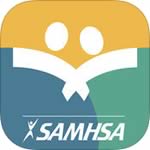 SAMHSA's latest mobile app, Suicide Safe, is now available for free on iOS® and Android™ mobile devices.
SAMHSA's latest mobile app, Suicide Safe, is now available for free on iOS® and Android™ mobile devices.
The app, based on the nationally recognized Suicide Assessment Five-Step Evaluation and Triage (SAFE-T) card, is designed to help primary care and behavioral health providers integrate suicide prevention strategies into their practices and address suicide risk among their patients.
Learn more about the Suicide Safe app.
The Virtual Hope Box
 The Virtual Hope Box (VHB) is a smartphone application designed for use by patients and their behavioral health providers as an accessory to treatment. The VHB contains simple tools to help patients with coping, relaxation, distraction, and positive thinking.
The Virtual Hope Box (VHB) is a smartphone application designed for use by patients and their behavioral health providers as an accessory to treatment. The VHB contains simple tools to help patients with coping, relaxation, distraction, and positive thinking.
Patients and providers can work together to personalize the VHB content on the patient's own smartphone according to the patient's specific needs. The patient can then use the VHB away from clinic, continuing to add or change content as needed.
The VHB provides help with emotional regulation and coping with stress via personalized supportive audio, video, pictures, games, mindfulness exercises, positive messages and activity planning, inspirational quotes, coping statements, and other tools.
The VHB is available for both iOS and Android.
ACT Coach
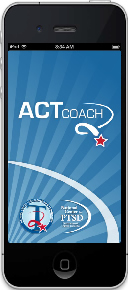 Acceptance and Commitment Therapy (ACT) aims to help you live with unpleasant thoughts, feelings, and impulses without avoiding them or being controlled by them. In ACT, you are encouraged to commit to actions so that you can live your life by your values, even in the face of these unpleasant experiences. This app was developed for Veterans, Service members, and other people who are in Acceptance and Commitment Therapy in consultation with a therapist. It offers exercises, tools, information, and tracking logs so you can practice what you’re learning in your daily life. The ACT Coach app can be downloaded from iTunes (search on ACT Coach). For more information on ACT Coach visit the Mobile Behavior Design Lab website.
Acceptance and Commitment Therapy (ACT) aims to help you live with unpleasant thoughts, feelings, and impulses without avoiding them or being controlled by them. In ACT, you are encouraged to commit to actions so that you can live your life by your values, even in the face of these unpleasant experiences. This app was developed for Veterans, Service members, and other people who are in Acceptance and Commitment Therapy in consultation with a therapist. It offers exercises, tools, information, and tracking logs so you can practice what you’re learning in your daily life. The ACT Coach app can be downloaded from iTunes (search on ACT Coach). For more information on ACT Coach visit the Mobile Behavior Design Lab website.
Mobile Behavior Design Lab
The Mobile Behavior Design Lab is a valuable resource for mobile apps beneficial to Veterans and providers. From their website: Founded by Dr. Julia Hoffman in 2011, the Mobile Behavior Design Lab is a multidisciplinary collaborative of psychologists, sociologists, app designers, software engineers, and graduate students in the heart of Silicon Valley. Our team builds mHealth products for mental health, creates resources to facilitate the integration of mHealth into mental health care, analyzes technological developments to support good governance, and provides a growing knowledge base to assist the growing community of mHealth creators. For more information, please contact Dr. Julia Hoffman, Director (julia.hoffman@va.gov). Their mobile apps, for both iPhones and Android, include:
-
CBT-i Coach


- CBT-i Coach is for people who are engaged in Cognitive Behavioral Therapy for Insomnia with a health provider, or who have experienced symptoms of insomnia and would like to improve their sleep habits. More information >>
-
Concussion Coach


- Concussion Coach was designed for Veterans, Service members, and other individuals who experience physical, cognitive, and emotional symptoms that may be related to mild to moderate traumatic brain injury. More information >>
-
CPT Coach


- CPT Coach is for Veterans, Service members, and others with PTSD who are participating in Cognitive Processing Therapy (CPT) with a professional mental healthcare provider. More information >>
-
Mindfulness Coach


- This app was developed to help Veterans, Service members, and others learn how to practice mindfulness. It offers exercises, information, and a tracking log so that you can optimize your practice. More information >>
-
Mood Coach


- Behavioral Activation (BA) is a widely used and empirically supported therapeutic approach to working with depression. This app includes the core pieces of Behavioral Activation: it starts by monitoring mood as related to already-existing activities, and then guides the user in selecting and scheduling rewarding activities. More information >>
-
Moving Forward


- Moving Forward provides on-the-go tools and teaches problem solving skills to overcome obstacles and deal with stress. The app is designed for Veterans and Service members, but is useful for anyone with stressful problems. More information >>
-
Parenting2Go


- Parenting2Go helps Veterans and Service members reconnect with their children and provides convenient tools to strengthen parenting skills. It can be used alone or in combination with the online Parenting for Service Members & Veterans course. More information >>
-
PE Coach


- PE Coach is designed to be used during psychotherapy provided by a behavioral health professional who is trained in Prolonged Exposure (PE) therapy. Veterans, Service members, and others with symptoms of PTSD who are receiving PE treatment can work together with their therapist to use the tools in this app. More information >>
-
PTSD Coach


- PTSD Coach is a mobile phone app for the self-management of post-traumatic stress disorder (PTSD). It is designed for veterans, service members, and trauma survivors who may be experiencing symptoms of PTSD, as well as for their families and others who would like to learn more about post-traumatic stress. More information >>
-
PFA Mobile

- PFA Mobile is a mobile phone application for mental health providers and other response workers who provide Psychological First Aid (PFA) shortly after disasters and emergencies to affected children, families, and adults. More information >>
-
PTSD Coach


- PTSD Coach is a mobile phone app for the self-management of post-traumatic stress disorder (PTSD). It is designed for veterans, service members, and trauma survivors who may be experiencing symptoms of PTSD, as well as for their families and others who would like to learn more about post-traumatic stress. More information >>
-
PTSD Family Coach


- PTSD Family Coach was designed for family members of individuals with Posttraumatic Stress Disorder (PTSD). This app provides education about PTSD, a self-assessment tool measuring life stress, self-management skills to address acute distress and stress, direct connection to support and information about VA and community resources for family members of individuals with PTSD. More information >>
-
Safety Plan


- Safety Plan is an app to help people who are at risk of self-harm and direct them towards support services. The user can set up a personalized safety plan that specifies steps to take when they need immediate help for different kinds of crisis. More information >>
Look on the Mobile Behavior Design Lab website for more apps that are coming soon.















